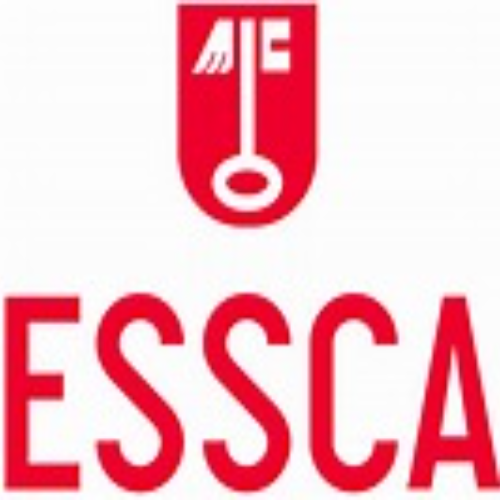With the onslaught of corporate TikTok accounts, AI counsellors, and an entire global pandemic, if there’s one thing the 2020s have taught us so far, it’s that the future work trends are hard to predict.
Fortunately, there are some changes that look like they’re here to stay. Leading program coordinator Professor Yann Truong of ESSCA School of Management (pictured right) believes he can narrow them down to just two.

Given the sheer volume of internet traffic, it can be hard to imagine just how much data that is. For anyone that’s ever clicked an “accept” button on a cookie tracking banner, that information is going straight into a multi-billion-dollar vat of data soup–one that corporations are likely going to need the help of AI algorithms to slurp back up.
But technology isn’t the only thing determining tomorrow’s workplace: “The second trend,” Yann continues, “is sustainability.”
Prioritized by younger generations now more than ever, a recent survey shows that an entire 42% of prospective business school students demand lessons in sustainability on their desired business school programs.
So, if the future of work is set to be defined by just two key trends, what should you study for the workplace of tomorrow?
1. Data Analytics and Finance
What is data but a bunch of computer code anyway? Data analytics is the skill that makes all of that stuff–the amalgamation of numbers, names, IP addresses–into the tangible information that companies so highly value.
Now, with big data defining the future corporate landscape, learning how to decipher it is becoming more important for every industry. Not least, finance.
“Financial organizations are finding out right now that the predictions made by algorithms that exploit this data tend to be more accurate than the predictions made by humans,” Yann explains.
That’s why at ESSCA, where Yann leads both masters and international programs, students can apply to study an MSc in Finance and Data Analytics, combining foundational finance modules–such as Financial Markets and Banking–with technical data analysis skills.
Data analysis courses include modules on coding, machine learning, and the creation of financial models–all of which, Yann says, will also involve the eventual leveraging of AI.
2. Artificial Intelligence (AI)
Though it may seem like the buzz surrounding AI began just this year, in truth it’s been a hot topic among scientists for a few decades now.
It’s why Yann felt confident when he first shifted his research focus to AI management that it would be fundamental to the future business sphere.
“In all business sectors many companies now are trying to deploy AI to automate tasks, to get insights for decision-making, and also to use it as an assistant tool, like ChatGPT,” he says.
“As a future manager graduating from business school, if you have no knowledge of this type of technology then you will be completely overwhelmed once you are in a position that will require you to be able to understand AI.”
In order to bridge this gap, ESSCA is preparing to launch its first ever Master in Management of Artificial Intelligence program in 2024, which will be taught in two of the school’s 10 global campuses, Paris and Malaga.
During the course, students will learn an array of soft and technical skills so that they can utilize AI in a wide range of roles.
Technical skills include learning coding languages such as Python–which are essential to build AI algorithms–as well as courses on data governance, data management, data analytics, machine learning, and digital transformation.
Technical capabilities are then combined with people management skills, such as the use of AI to further creativity and teamwork.
3. Sustainability
With global temperatures likely to rise 1.5C above pre-industrial levels over the next five years, studying sustainability was something that former Ghanian banker Frank Agyei (pictured below) recognized was imperative to making positive change to his home country.

During the course, students not only learn core sustainability practices such as CSR frameworks, they are also taught how to create more socially responsible businesses through improving diversity and employee wellbeing.
Students then further specialize in a wide range of practical areas such as finance, marketing, and supply chain.
This allowed Frank to combine his sustainability and banking skills to branch into a PhD in sustainable finance, where he spends his time researching how the industry can make more environmentally conscious decisions.
“We cannot have a society that is not financed by financial institutions. Without finance, sustainability is not going to be possible,” he says.

Similarly, for US-born Chris Pattullo (pictured right), the school’s sustainability master’s provided him with the skillset to write his thesis on the ‘circular economy’–a concept predicated on the idea that everything in society can be recycled.
Now working for the cutting-edge aerospace startup, Wisk, Chris uses this theory to advise businesses on how they can cut down on waste.
“For example, instead of throwing batteries out, we work out how can we make batteries repairable, or have replaceable parts,” Chris explains.
Both Chris and Frank credit their experience in the sustainability course with providing the tools to bring about positive change.
As sustainability and technology trends continue define the modern working environment, choosing a program covering these areas could leave you poised to make a major impact within the future workplace.
Student Reviews
ESSCA








